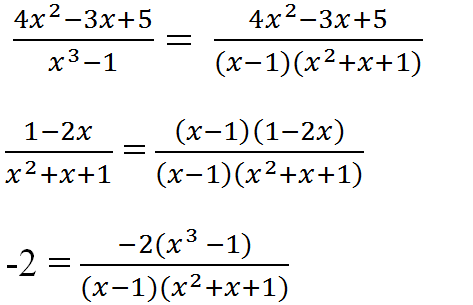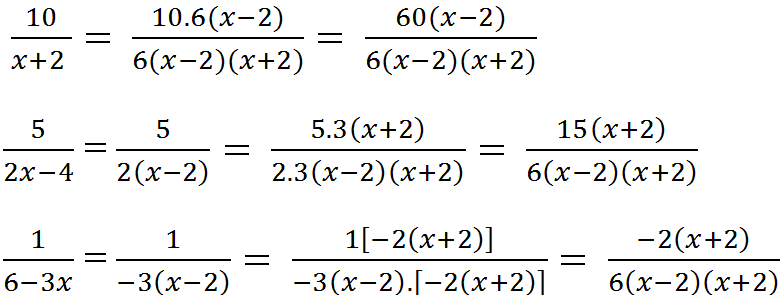Hãy nhập câu hỏi của bạn vào đây, nếu là tài khoản VIP, bạn sẽ được ưu tiên trả lời.

a) \(\dfrac{3x}{2x+4}\) và \(\dfrac{x+3}{x^2-4}\)
Phân tích các mẫu thức thành nhân tử :
\(2x+4 = 2(x+2)\)
\(x^2 - 4 = (x-2)(x+2)\)
MTC : \(2(x+2)(x-2)\)
Nhân tử phụ của mẫu thức : \(2x + 4\) là \((x - 2)\)
\(x^2 - 4\) là \(2\)
QĐ: \(\dfrac{3x}{2x+4}=\dfrac{3x}{2\left(x+2\right)}=\dfrac{3x\left(x-2\right)}{2\left(x+2\right)\left(x-2\right)}\)
\(\dfrac{x+3}{x^2-4}=\dfrac{x+3}{\left(x+2\right)\left(x-2\right)}=\dfrac{2\left(x+3\right)}{2\left(x+2\right)\left(x-2\right)}\)
b) \(\dfrac{x+5}{x^2+4x+4}\) và \(\dfrac{x}{3x+6}\)
Phân tích các mẫu thức thành nhân tử :
\(x^2+4x+4 = (x+2)^2\)
\(3x + 6\) \(= 3(x+2)\)
MTC : \(3(x+2)^2\)
Nhân tử phụ của mẫu thức : \(x^2 + 4x +4 \) là \(3\)
\(3x + 6\) là \((x+2)\)
QĐ : \(\dfrac{x+5}{x^2+4x+4}=\dfrac{\left(x+5\right)}{\left(x+2\right)^2}=\dfrac{3\left(x+5\right)}{3\left(x+2\right)^2}\)
\(\dfrac{x}{3x+6}=\dfrac{x}{3\left(x+2\right)}=\dfrac{x\left(x+2\right)}{3\left(x+2\right)^2}\)

MTC=xy(x-y)(x+2y)
\(\dfrac{x+y}{x}=\dfrac{y\left(x+y\right)\left(x-y\right)\left(x+2y\right)}{xy\left(x-y\right)\left(x+2y\right)}\)
\(\dfrac{x}{x-y}=\dfrac{x^2y\left(x+2y\right)}{xy\left(x-y\right)\left(x+2y\right)}\)
\(\dfrac{2}{x^2+2xy}=\dfrac{2}{x\left(x+2y\right)}=\dfrac{y\left(x-y\right)}{xy\left(x-y\right)\left(x+2y\right)}\)
\(\dfrac{1}{xy+2y^2}=\dfrac{1}{y\left(x+2y\right)}=\dfrac{x\left(x-y\right)}{xy\left(x-y\right)\left(x+2y\right)}\)

Bài giải
a) \(\dfrac{1}{x+2}=\dfrac{x.\left(x-2\right)}{\left(x+2\right)\left(x-2\right).x}=\dfrac{x^2-2x}{x\left(x+2\right)\left(x-2\right)}\)
\(\dfrac{8}{2x-x^2}=\dfrac{8}{x\left(2-x\right)}=-\dfrac{8}{x\left(x-2\right)}=-\dfrac{8.\left(x+2\right)}{x\left(x-2\right)\left(x+2\right)}\)
b) \(x^2+1=\dfrac{x^2+1}{1}=\dfrac{\left(x^2+1\right)\left(x^2-1\right)}{x^2-1}=\dfrac{x^4-1}{x^2-1}\)
\(\dfrac{x^4}{x^2-1}\) giữ nguyên.
c) \(\dfrac{x^3}{x^3-3x^2y+3xy^2-y^3}=\dfrac{x^3}{\left(x-y\right)^3}=\dfrac{x^3.y}{\left(x-y\right)^3.y}=\dfrac{x^3y}{y\left(x-y\right)^3}\)
\(\dfrac{x}{y^2-xy}=\dfrac{x}{y.\left(y-x\right)}=-\dfrac{x}{y.\left(x-y\right)}=-\dfrac{x\left(x-y\right)^2}{y.\left(x-y\right).\left(x-y\right)^2}=\dfrac{x\left(x-y\right)^2}{y.\left(x-y\right)^3}\)
Quy đồng mẫu thức các phân thức:
a,\(\dfrac{x-1}{x^3+1}\),\(\dfrac{2x}{x^2-x+1}\),\(\dfrac{2}{x+1}\)

Có \(\dfrac{x-1}{x^3+1}\) \(=\dfrac{x-1}{\left(x+1\right)\left(x^2-x+1\right)}\)
MTC : \(\text{(x+1)(x^2-x+1)}\)
\(\Rightarrow\dfrac{x-1}{x^3+1}\) \(=\dfrac{x-1}{\left(x+1\right)\left(x^2-x+1\right)}\)
\(\Rightarrow\dfrac{2x}{x^2-x+1}=\dfrac{2x\left(x+1\right)}{\left(x+1\right)\left(x^2-x+1\right)}\)
\(\Rightarrow\dfrac{2}{x+1}=\dfrac{2\left(x^2-x+1\right)}{\left(x+1\right)\left(x^2-x+1\right)}\)

a) Tìm MTC: x3 – 1 = (x – 1)(x2 + x + 1)
Nên MTC = (x – 1)(x2 + x + 1)
Nhân tử phụ:
(x3 – 1) : (x3 – 1) = 1
(x – 1)(x2 + x + 1) : (x2 + x + 1) = x – 1
(x – 1)(x2+ x + 1) : 1 = (x – 1)(x2 + x + 1)
Qui đồng:
b) Tìm MTC: x + 2
2x – 4 = 2(x – 2)
6 – 3x = 3(2 – x)
MTC = 6(x – 2)(x + 2)
Nhân tử phụ:
6(x – 2)(x + 2) : (x + 2) = 6(x – 2)
6(x – 2)(x + 2) : 2(x – 2) = 3(x + 2)
6(x – 2)(x + 2) : -3(x – 2) = -2(x + 2)
Qui đồng:

1)
\(\dfrac{4x^2-3x+5}{x^3-1}=\dfrac{4x^2-3x+5}{\left(x-1\right)\left(x^2+x+1\right)}\)
MTC: \(\left(x-1\right)\left(x^2+x+1\right)\)
\(\dfrac{4x^2-3x+5}{x^3-1}=\dfrac{4x^2-3x+5}{\left(x-1\right)\left(x^2+x+1\right)}\)
\(\dfrac{1-2x}{x^2+x+1}=\dfrac{\left(x-1\right)\left(1-2x\right)}{\left(x-1\right)\left(x^2+x+1\right)}=\dfrac{x-2x^2-1+2x}{\left(x-1\right)\left(x^2+x+1\right)}=\dfrac{3x-2x^2-1}{\left(x-1\right)\left(x^2+x+1\right)}=\)
\(-2=\dfrac{-2\left(x-1\right)\left(x^2+x+1\right)}{\left(x-1\right)\left(x^2+x+1\right)}=\dfrac{-2\left(x^3-1\right)}{\left(x-1\right)\left(x^2+x+1\right)}=\dfrac{-2x^3+2}{\left(x-1\right)\left(x^2+x+1\right)}\)






MTC=x(x+1)(x-1)
\(\dfrac{1}{x^2+x}=\dfrac{1}{x\left(x+1\right)}=\dfrac{x-1}{x\left(x+1\right)\left(x-1\right)}\)
\(\dfrac{1}{x^2-x}=\dfrac{1}{x\left(x-1\right)}=\dfrac{x+1}{x\left(x-1\right)\left(x+1\right)}\)